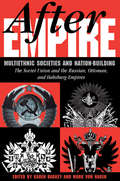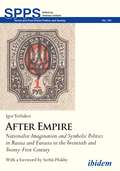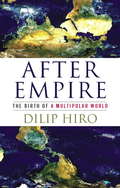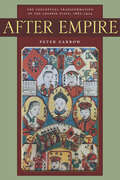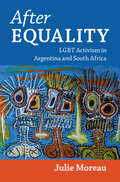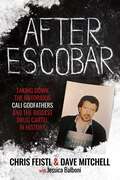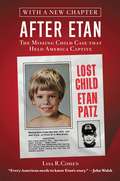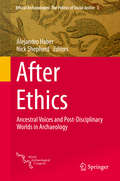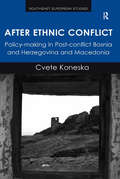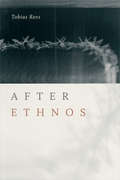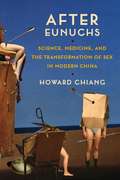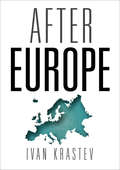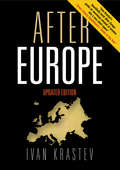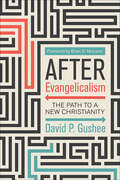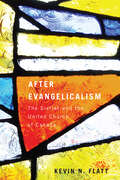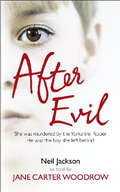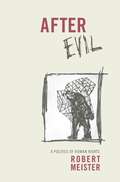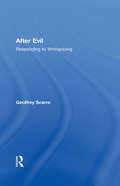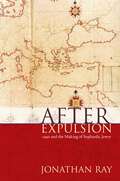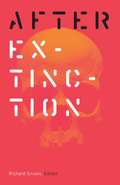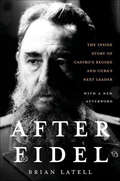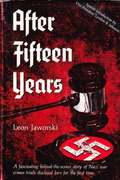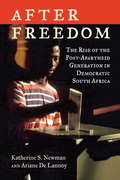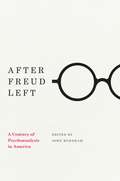- Table View
- List View
After Empire: Multiethnic Societies And Nation-building: The Soviet Union And The Russian, Ottoman, And Habsburg Empires
by Karen BarkeyThe Soviet Union was hardly the first large, continuous, land-based, multinational empire to collapse in modern times. The USSR itself was, ironically, the direct result of one such demise, that of imperial Russia, which in turn was but one of several other such empires that did not survive the stresses of the times: the Austro-Hungarian Empire of the Habsburgs and the Ottoman Empire.This ambitious and important volume brings together a group of some of the most outstanding scholars in political science, history, and historical sociology to examine the causes of imperial decline and collapse. While they warn against facile comparisons, they also urge us to step back from the immediacy of current events to consider the possible significance of historical precedents.Is imperial decline inevitable, or can a kind of imperial stasis be maintained indefinitely? What role, if any, does the growth of bureaucracies needed to run large and complex political systems of this type play in economic and political stagnation? What is the balance of power" between the centre and the peripheries, between the dominant nationality and minorities? What coping mechanisms do empires tend to develop and what influence do these have? Is modernization the inexorable source of imperial decline and ultimate collapse? And what resources, including the imperial legacy, are available for political, social, and economic reconstruction in the aftermath of collapse? These are just a few of the tantalizing questions addressed by the contributors to this fascinating and timely volume.
After Empire: Nationalist Imagination and Symbolic Politics in Russia and Eurasia in the Twentieth and Twenty-First Century (Soviet And Post-soviet Politics And Society Ser. #191)
by Igor TorbakovIgor Torbakov explores the nexus between various forms of Russian political imagination and the apparently cyclic process of the decline and fall of Russia’s imperial polity over the last hundred years. While Russia’s historical process is by no means unique, two features of its historical development stand out. First, the country’s history is characterized by dramatic political discontinuity. In the past century, Russia changed its “historical skin” three times: following the disintegration of the Tsarist Empire accompanied by violent civil war, it was reconstituted as the communist USSR, whose breakup a quarter century ago led to the emergence of the present-day Russian Federation. Each of the dramatic transformations in the twentieth century powerfully affected the notion of what “Russia” is and what it means to be Russian. Second, alongside Russia’s political instability, there is, paradoxically, a striking picture of geopolitical stability and of remarkable longevity as an imperial entity. At least since the beginning of the eighteenth century, “Russia” has been a permanent geopolitical fixture on Europe’s northeastern margins with its persistent pretense to the status of a great power. Against this backdrop, the book’s three sections investigate (a) the emergence and development of Eurasianism as a form of (post-)imperial ideology, (b) the crucial role Ukraine has historically played for the Russians’ self-understanding, and (c) contemporary Russian elites’ exercises in historical legitimation.
After Empire: The Birth of a Multipolar World
by Dilip HiroAmerican corporations have to beg for capital from the cash-rich Sovereign Wealth Funds in the Persian Gulf. By invading Iraq, President George W. Bush grossly undermined American credibility in the international arena and irrevocably weakened Washington’s diplomatic clout. Together, these historic shifts have provided an opportunity for the world to move from the tutelage of the sole superpower, America, to a multi-polar global order, one where America’s moral, economic, and military leadership will be profoundly challenged. What form will this world resemble? What are the perils and promises of this new power order? InAfter Empire, Dilip Hiro provides a realistic, challenging, and nuanced look at the emerging power politics of the coming century and considers how they are going to turn our world upside-down.
After Empire: The Conceptual Transformation of the Chinese State, 1885-1924
by Peter ZarrowFrom 1885-1924, China underwent a period of acute political struggle and cultural change, brought on by a radical change in thought: after over 2,000 years of monarchical rule, the Chinese people stopped believing in the emperor. These forty years saw the collapse of Confucian political orthodoxy and the struggle among competing definitions of modern citizenship and the state. What made it possible to suddenly imagine a world without the emperor? After Empiretraces the formation of the modern Chinese idea of the state through the radical reform programs of the late Qing (1885-1911), the Revolution of 1911, and the first years of the Republic through the final expulsion of the last emperor of the Qing from the Forbidden City in 1924. It contributes to longstanding debates on modern Chinese nationalism by highlighting the evolving ideas of major political thinkers and the views reflected in the general political culture. Zarrow uses a wide range of sources to show how "statism" became a hegemonic discourse that continues to shape China today. Essential to this process were the notions of citizenship and sovereignty, which were consciously adopted and modified from Western discourses on legal theory and international state practices on the basis of Chinese needs and understandings. This text provides fresh interpretations and keen insights into China's pivotal transition from dynasty to republic.
After Equality: LGBT Activism in Argentina and South Africa (Cambridge Studies in Gender and Politics)
by Julie MoreauAfter Equality tackles one of the biggest challenges facing LGBT activists in many parts of the world: how to move beyond inclusive legislation to ensure LGBT people can exercise their newly acquired rights. Drawing from in-depth interviews and ethnographic observation with two lesbian organizations in Buenos Aires, Argentina and Cape Town, South Africa, Julie Moreau explores the ways that organizations use identity to make rights useful. Engaging interdisciplinary scholarship and intersectional theory, Moreau develops a novel approach to identity strategizing that explains how activists engage multiple identities to challenge the relationships between identity categories and address the ways interlocking systems of power affect their constituents. By analyzing sexual identity as always constructed through race, class and gender, the book transforms how scholars understand the role of identity in the strategic repertoires of social movement organizations and illuminates dimensions of identity politics that surface in the aftermath of legal inclusion.
After Escobar
by Dave Mitchell Chris Feistl Jessica BalboniRenowned DEA agents Chris Feistl and Dave Mitchell tell the incredible true story of how they helped dismantle the world&’s single most powerful crime syndicate, as featured in Season 3 of the hit Netflix series Narcos.By the early 1990s, Colombia&’s Cali cartel had become what the former head of the DEA Thomas Constantine referred to as &“The biggest and most powerful crime syndicate in history.&” Responsible for nearly 85% of the cocaine that reached U.S. soil and 90% worldwide, they were untouchable, earning billions of dollars all while maintaining their reputation as &‘The Godfathers of Cali&” and brazenly corrupting thousands of Colombian authorities and government officials, even &“buying&” the outcome of the 1994 presidential election. In 1994, the DEA sent young operatives Chris Feistl and Dave Mitchell to Colombia with one formidable task: help Colombian authorities take down the ruthless leaders of the brutal Cali cartel. Not any easy job for two men who looked more like tall, lanky surfers than DEA agents: standing well over six feet tall and only six years removed from the DEA Academy, they were the epitome of conspicuous in a city where most residents rarely, if ever, saw an American in person. Many of their colleagues feared for their safety, openly questioning their ability to blend in. Their almost three-year journey would lead them from the bureaucratic halls of the U.S. Embassy to the violent streets of Cali and deep into its rural sugar cane fields, on high alert day and night as they dodged deadly cartel assassins and oftentimes worked unilaterally to battle the unprecedented corruption within Colombia&’s security forces. Over time their relentless efforts began to slowly degrade the godfathers&’ defenses and weaken their infrastructure.
After Etan: The Missing Child Case that Held America Captive
by Lisa R. CohenOn the morning of May 25, 1979, six-year-old Etan Patz left his apartment to go to his school bus stop. It was the first time he walked the two short blocks on his own.But he never made it to school that day. He vanished somewhere between his home and the bus stop, and was never seen again.The search for Etan quickly consumed the downtown Manhattan neighborhood where his family lived. Soon afterward, "Missing" posters with Etan's smiling face blanketed the city, followed by media coverage that turned Etan's disappearance into a national story-one that would change our cultural landscape forever.Thirty years later, May 25 is recognized as National Missing Children's Day, in Etan's honor. But despite the overwhelming publicity his case received, the public knows only a fraction of what happened. That's because the story of Etan Patz is more than a heartbreaking mystery. It is also the story of the men, women, and children who were touched by his life in the months and years after he vanished. It's the story of the agonies and triumphs of the Patz family. It's the story of the extraordinary twists and turns of federal prosecutor Stuart GraBois's relentless pursuit of his prime suspect. From GraBois's creative "outside the box" tactics, to the veteran cop who made his first pedophile bust on a dark Times Square rooftop, to the FBI rookie who cut her teeth chasing the case through the dark recesses of a child molester's mind, this is the story of all the heroic investigators who to this day, thirty years later, continue to seek justice for Etan.In AFTER ETAN, author Lisa Cohen draws on hundreds of interviews and nearly twenty years of research-including access to the personal files of the Patz family-to reveal for the first time the entire dramatic tale.
After Ethics: Ancestral Voices and Post-Disciplinary Worlds in Archaeology (Ethical Archaeologies: The Politics of Social Justice #3)
by Alejandro Haber Nick ShepherdWhile books on archaeological and anthropological ethics have proliferated in recent years, few attempt to move beyond a conventional discourse on ethics to consider how a discussion of the social and political implications of archaeological practice might be conceptualized differently. The conceptual ideas about ethics posited in this volume make it of interest to readers outside of the discipline; in fact, to anyone interested in contemporary debates around the possibilities and limitations of a discourse on ethics. The authors in this volume set out to do three things. The first is to track the historical development of a discussion around ethics, in tandem with the development and "disciplining" of archaeology. The second is to examine the meanings, consequences and efficacies of a discourse on ethics in contemporary worlds of practice in archaeology. The third is to push beyond the language of ethics to consider other ways of framing a set of concerns around rights, accountabilities and meanings in relation to practitioners, descendent and affected communities, sites, material cultures, the ancestors and so on.
After Ethnic Conflict: Policy-making in Post-conflict Bosnia and Herzegovina and Macedonia (Southeast European Studies)
by Cvete KoneskaAfter Ethnic Conflict: Policy-making in Post-conflict Bosnia and Herzegovina and Macedonia investigates how sensitive policy issues can be resolved in the aftermath of war by investigating how political elites interact and make decisions in ethnically divided societies. Focussing on the interactions between political elites and attempts to reach agreement across ethnic lines in Bosnia and Macedonia the book examines the impact that institutional factors can have on political actors and the decisions they make. Examining domestic factors and external influence in politics, Cvete Koneska identifies four key drivers of post-conflict cooperation: cross-cutting identities, minority veto powers, territorial autonomy, and informal practices to explain inter-ethnic political accommodation. By looking beyond the immediate post-conflict landscape, created by foreign peace negotiators and aid missions, to the internal political process she shows the real reasons political actors cooperate and how competing ethnic tensions are reconciled following ethnic conflict. Delving deeper into specific policy areas to compare successful and unsuccessful attempts at ethnic accommodation this book explores the factors behind the different policy outcomes that sustain or undermine peace and ethnic cooperation in ethnically divided societies.
After Ethnos
by Tobias ReesFor most of the twentieth century, anthropologists understood themselves as ethnographers. The art of anthropology was the fieldwork-based description of faraway others—of how social structures secretly organized the living-together of a given society, of how a people had endowed the world surrounding them with cultural meaning. While the poetics and politics of anthropology have changed dramatically over the course of a century, the basic equation of anthropology with ethnography—as well as the definition of the human as a social and cultural being—has remained so evident that the possibility of questioning it occurred to hardly anyone. In After Ethnos Tobias Rees endeavors to decouple anthropology from ethnography—and the human from society and culture—and explores the manifold possibilities of practicing a question-based rather than an answer-based anthropology that emanates from this decoupling. What emerges from Rees's provocations is a new understanding of anthropology as a philosophically and poetically inclined, fieldwork-based investigation of what it could mean to be human when the established concepts of the human on which anthropology has been built increasingly fail us.
After Eunuchs: Science, Medicine, and the Transformation of Sex in Modern China
by Howard ChiangFor much of Chinese history, the eunuch stood out as an exceptional figure at the margins of gender categories. Amid the disintegration of the Qing Empire, men and women in China began to understand their differences in the language of modern science. In After Eunuchs, Howard Chiang traces the genealogy of sexual knowledge from the demise of eunuchism to the emergence of transsexuality, showing the centrality of new epistemic structures to the formation of Chinese modernity.From anticastration discourses in the late Qing era to sex-reassignment surgeries in Taiwan in the 1950s and queer movements in the 1980s and 1990s, After Eunuchs explores the ways the introduction of Western biomedical sciences transformed normative meanings of gender, sexuality, and the body in China. Chiang investigates how competing definitions of sex circulated in science, medicine, vernacular culture, and the periodical press, bringing to light a rich and vibrant discourse of sex change in the first half of the twentieth century. He focuses on the stories of gender and sexual minorities as well as a large supporting cast of doctors, scientists, philosophers, educators, reformers, journalists, and tabloid writers, as they debated the questions of political sovereignty, national belonging, cultural authenticity, scientific modernity, human difference, and the power and authority of truths about sex. Theoretically sophisticated and far-reaching, After Eunuchs is an innovative contribution to the history and philosophy of science and queer and Sinophone studies.
After Europe
by Ivan KrastevIn this provocative book, renowned public intellectual Ivan Krastev reflects on the future of the European Union—and its potential lack of a future. With far-right nationalist parties on the rise across the continent and the United Kingdom planning for Brexit, the European Union is in disarray and plagued by doubts as never before. Krastev includes chapters devoted to Europe's major problems (especially the political destabilization sparked by the more than 1.3 million migrants from the Middle East, North Africa, and South Asia), the spread of right-wing populism (taking into account the election of Donald Trump in the United States), and the thorny issues facing member states on the eastern flank of the EU (including the threat posed by Vladimir Putin's Russia). He concludes by reflecting on the ominous political, economic, and geopolitical future that would await the continent if the Union itself begins to disintegrate.
After Europe
by Ivan KrastevIn this provocative book, renowned public intellectual Ivan Krastev reflects on the future of the European Union—and its potential lack of a future. With far-right nationalist parties on the rise across the continent and the United Kingdom planning for Brexit, the European Union is in disarray and plagued by doubts as never before. Krastev includes chapters devoted to Europe's major problems (especially the political destabilization sparked by the more than 1.3 million migrants from the Middle East, North Africa, and South Asia), the spread of right-wing populism (taking into account the election of Donald Trump in the United States), and the thorny issues facing member states on the eastern flank of the EU (including the threat posed by Vladimir Putin's Russia). In a new afterword written in the wake of the 2019 EU parliamentary elections, Krastev concludes that although the union is as fragile as ever, its chances of enduring are much better than they were just a few years ago.
After Evangelicalism
by David P. GusheeNamed one of the Top 10 Books of the Year in 2020 by the Academy of Parish Clergy</p><p>"Drawing on his own spiritual journey, David Gushee provides an incisive critique of American evangelicalism [and] offers a succinct yet deeply informed guide for post-evangelicals seeking to pursue Christ-honoring lives." —Kristin Kobes Du Mez, Calvin University</p><p>Millions are getting lost in the evangelical maze: inerrancy, indifference to the environment, deterministic Calvinism, purity culture, racism, LGBTQ discrimination, male dominance, and Christian nationalism. They are now conscientious objectors, deconstructionists, perhaps even "none and done." As one of America's leading academics speaking to the issues of religion today, David Gushee offers a clear assessment and a new way forward for disillusioned post-evangelicals.</p><p>Gushee starts by analyzing what went wrong with U.S. white evangelicalism in areas such as evangelical history and identity, biblicism, uncredible theologies, and the fundamentalist understandings of race, politics, and sexuality. Along the way, he proposes new ways of Christian believing and of listening to God and Jesus today. He helps post-evangelicals know how to belong and behave, going from where they are to a living relationship with Christ and an intellectually cogent and morally robust post-evangelical faith. He shows that they can have a principled way of understanding Scripture, a community of Christ's people, a healthy politics, and can repent and learn to listen to people on the margins.</p><p>With a foreword from Brian McLaren, who says, “David Gushee is right: there is indeed life after evangelicalism,” this book offers an essential handbook for those looking for answers and affirmation of their journey into a future that is post-evangelical but still centered on Jesus. If you, too, are struggling, After Evangelicalism shows that it is possible to cut loose from evangelical Christianity and, more than that, it is necessary.</p>
After Evangelicalism
by Kevin N. FlattAt a time when Canadians were arguing about the merits of a new flag, the birth-control pill, and the growing hippie counterculture, the leaders of Canada's largest Protestant church were occupied with turning much of English-Canadian religious culture on its head. In After Evangelicalism, Kevin Flatt reveals how the United Church of Canada abruptly reinvented its public image by cutting the remaining ties to its evangelical past. Flatt argues that although United Church leaders had already abandoned evangelical beliefs three decades earlier, it was only in the 1960s that rapid cultural shifts prompted the sudden dismantling of the church's evangelical programs and identity. Delving deep into the United Church's archives, Flatt uncovers behind-the-scenes developments that led to revolutionary and controversial changes in the church's evangelistic campaigns, educational programs, moral stances, and theological image. Not only did these changes evict evangelicalism from the United Church, but they helped trigger the denomination's ongoing numerical decline and decisively changed Canada's religious landscape. Challenging readers to see the Canadian religious crisis of the 1960s as involving more than just Quebec's Quiet Revolution, After Evangelicalism unveils the transformation of one of Canada's most prominent social institutions.
After Evil
by Jane Carter Woodrow**AS FEATURED IN THE NETFLIX SERIES THE RIPPER**Criminologist Jane Carter Woodrow has spent many years working with both offenders and victims of violent crime, but it wasn't until she met Neil, whose mother was one of the Yorkshire Ripper's first victims, that she realised quite how devastating the aftermath of a murder can be. Everything seemed perfect in Neil Jackson's childhood until one day, on a cold January morning in 1976. He was awoken by the police knocking on the door to break the shocking news that his mother had become the second victim of a serial killer - soon to become known as the 'Yorkshire Ripper'. This evil act exposed a web of secrets and lies that was to devastate Neil and change his life forever. In After Evil, criminologist Jane Carter Woodrow reveals what happens when the camera and the lurid headlines fade away. Neil's riveting story captures the real nature of the tragedy that murder can visit on a family and shows how incredibly he pieced his life back together after becoming one of the forgotten victims of Britain's most notorious serial killer.
After Evil: A Politics of Human Rights (Columbia Studies In Political Thought/political History)
by Robert MeisterThe way in which mainstream human rights discourse speaks of such evils as the Holocaust, slavery, or apartheid puts them solidly in the past. Its elaborate techniques of "transitional" justice encourage future generations to move forward by creating a false assumption of closure, enabling those who are guilty to elude responsibility. This approach to history, common to late-twentieth-century humanitarianism, doesn't presuppose that evil ends when justice begins. Rather, it assumes that a time before justice is the moment to put evil in the past. Merging examples from literature and history, Robert Meister confronts the problem of closure and the resolution of historical injustice. He boldly challenges the empty moral logic of "never again" or the theoretical reduction of evil to a cycle of violence and counterviolence, broken only once evil is remembered for what it was. Meister criticizes such methods for their deferral of justice and susceptibility to exploitation and elaborates the flawed moral logic of "never again" in relation to Auschwitz and its evolution into a twenty-first-century doctrine of the Responsibility to Protect.
After Evil: Responding to Wrongdoing
by Geoffrey ScarreEvils, both large and small, are a constant feature of human life. This book is about responding to them and in particular about responding to moral evils, that is, those produced by the deliberate acts of human beings. Prominent in our repertoire of responses to moral evil are forgiveness and punishment, and these, with the numerous conceptual and moral problems they raise, are at the heart of the study in this book. After discussing the idea of evil, Scarre turns to the meaning of forgiveness and the conditions for granting it. He defends a broadly utilitarian approach that stresses the role of forgiveness in repairing the damage that has been caused by injurious or offensive behaviour. Scarre then considers the controversial virtue of mercy and the propriety of revengeful behaviour and resentful attitudes. Finally, he deals with the purpose and justification of judicial punishment, paying particular regard to the appropriate treatment of war criminals. In this timely and sensitively written book, Scarre pays close attention to the existing literature and appraises both contemporary and classical contributions to the debate. This book makes an original contribution to an area of ethical thought that has been attracting an increasing amount of attention from philosophers, jurists and political thinkers.
After Evil: She Was One Of The Yorkshire Ripper's Victims, He Was The Boy Left Behind
by Carter Woodrow JaneCriminologist Jane Carter Woodrow has spent many years working with both offenders and victims of violent crime, but it wasn?t until she met Neil, whose mother was one of the Yorkshire Ripper?s first victims, that she realised quite how devastating the aftermath of a murder can be...
After Expulsion: 1492 and the Making of Sephardic Jewry
by Jonathan S RayA &“groundbreaking&” portrait of the migration and resettlement of Spain&’s Jewish community after 1492, and how the Sephardic identity emerged (American Historical Review). Honorable Mention, Jordan Schnitzer Book Award in Medieval and Early Modern Jewish History presented by the Association for Jewish Studies On August 3, 1492, the same day that Columbus set sail from Spain, the long and glorious history of that nation&’s Jewish community officially came to a close. The expulsion of Europe&’s last major Jewish community ended more than a thousand years of unparalleled prosperity, cultural vitality, and intellectual productivity. Yet, the crisis of 1492 also gave rise to a dynamic and resilient diaspora society spanning East and West. After Expulsion traces the various paths of migration and resettlement of Sephardic Jews and Conversos over the course of the tumultuous sixteenth century. Pivotally, the volume argues that the exiles did not become &“Sephardic Jews&” overnight. Only in the second and third generation did these disparate groups coalesce and adopt a &“Sephardic Jewish&” identity. This is a new and fascinating portrait of Jewish society in transition from the medieval to the early modern period—a portrait that challenges many longstanding assumptions about the differences between Europe and the Middle East. &“A rich and compelling history . . . With its intense focus on one century, Ray&’s book makes a distant time and trauma painfully vivid and immediate to the reader.&” ―Jewish Currents Magazine
After Extinction (21st Century Studies #6)
by Ashley Dawson Joseph Masco William E. Connolly Jussi Parikka Cary Wolfe Nicholas Mirzoeff Margaret Noodin Bernard C. Perley Claire Colebrook Joanna Zylinska Daryl BaldwinA multidisciplinary exploration of extinction and what comes next What comes after extinction? Including both prominent and unusual voices in current debates around the Anthropocene, this collection asks authors from diverse backgrounds to address this question. After Extinction looks at the future of humans and nonhumans, exploring how the scale of risk posed by extinction has changed in light of the accelerated networks of the twenty-first century. The collection considers extinction as a cultural, artistic, and media event as well as a biological one. The authors treat extinction in relation to a variety of topics, including disability, human exceptionalism, science-fiction understandings of time and posthistory, photography, the contemporary ecological crisis, the California Condor, systemic racism, Native American traditions, and capitalism.From discussions of the anticipated sixth extinction to the status of writing, theory, and philosophy after extinction, the contributions of this volume are insightful and innovative, timely and thought provoking. Contributors: Daryl Baldwin, Miami U; Claire Colebrook, Pennsylvania State U; William E. Connolly, Johns Hopkins U; Ashley Dawson, CUNY Graduate Center; Joseph Masco, U of Chicago; Nicholas Mirzoeff, New York U; Margaret Noodin, U of Wisconsin–Milwaukee; Jussi Parikka, U of Southampton; Bernard C. Perley, U of Wisconsin–Milwaukee; Cary Wolfe, Rice U; Joanna Zylinska, Goldsmiths, U of London.
After Fidel: The Inside Story of Castro's Regime and Cuba's Next Leader
by Brian LatellThis is a compelling behind-the-scenes account of the extraordinary Castro brothers and the dynastic succession of Fidel's younger brother Raul. Brian Latell, the CIA analyst who has followed Castro since the sixties, gives an unprecedented view into Fidel and Raul's remarkable relationship, revealing how they have collaborated in policy making, divided responsibilities, and resolved disagreements for more than forty years--a challenge to the notion that Fidel always acts alone. Latell has had more access to the brothers than anyone else in this country, and his briefs to the CIA informed much of U.S. policy. Based on his knowledge of Raul Castro, Latell makes projections on what kind of leader Raul will be and how the shift in power might influence U.S.-Cuban relations.
After Fifteen Years
by Leon JaworskiA Fascinating Behind-The-Scenes Story Of Nazi War Crimes Trials Disclosed Here For The First TimeLeon Jaworski was a prodigal lawyer, the youngest person ever to be admitted to the Texas Bar and was involved in some of the important cases in legal history. His enduring fame came from leading the prosecution of the Watergate case, United States v Nixon, and heading the large Texas based law firm Fulbright and Jaworski.Jaworski wrote a number of autobiographical books, in this, his first volume of memoirs, he reflects on his wartime career during which he served in the United States Army judge advocate general's department . He was made chief of the trial section of the war crimes branch in the late stages of the war in Europe. In this office he directed investigations of several hundred cases concerning German crimes against persons living and fighting in the American zone of occupation. He also personally tried two cases--the first having to do with the murder of American aviators shot down over Germany in 1944 and the second involving the doctors and staff of a German sanatorium where Polish and Russian prisoners were put to death. Jaworski had risen to the rank of colonel by the time he returned to civilian life in October 1945.
After Freedom
by Katherine S. Newman Ariane De LannoyTwenty years after the end of apartheid, a new generation is building a multiracial democracy in South Africa but remains mired in economic inequality and political conflict. This spring, South Africa will celebrate the twentieth anniversary of the fall of apartheid and the first free elections. Although the country has come far, frustration is growing as inequalities that once divided the races now grow within them. In After Freedom, award-winning sociologist Katherine S. Newman and South African expert Ariane De Lannoy profile seven people--Black, White, "Coloured," and immigrant--to reveal what life is like in South Africa today. These on-the-ground portraits offer an intimate look at the rising generation of young people and explore what the complex political landscape means to the average person. After Freedom is a timely look at how the generation that came of age post-apartheid is grappling with a tenuous democracy in a globalized economy.
After Freud Left: A Century of Psychoanalysis in America
by John BurnhamFrom August 29 to September 21, 1909, Sigmund Freud visited the United States, where he gave five lectures at Clark University in Worcester, Massachusetts. This volume brings together a stunning gallery of leading historians of psychoanalysis and of American culture to consider the broad history of psychoanalysis in America and to reflect on what has happened to Freud’s legacy in the United States in the century since his visit There has been a flood of recent scholarship on Freud’s life and on the European and world history of psychoanalysis, but historians have produced relatively little on the proliferation of psychoanalytic thinking in the United States, where Freud’s work had monumental intellectual and social impact. The essays in After Freud Left provide readers with insights and perspectives to help them understand the uniqueness of Americans’ psychoanalytic thinking, as well as the forms in which the legacy of Freud remains active in the United States in the twenty-first century. After Freud Left will be essential reading for anyone interested in twentieth-century American history, general intellectual and cultural history, and psychology and psychiatry.
